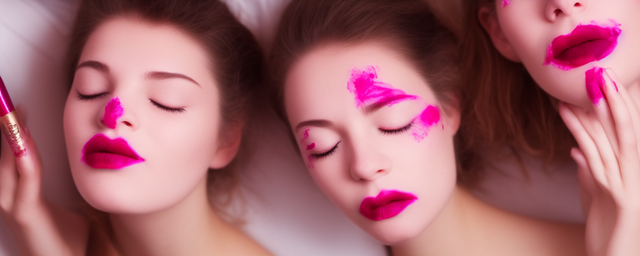
晚上涂唇膏睡觉的危害
原|2024-04-26 16:01:52|浏览:67
Applying lipstick before going to bed may seem harmless, but it can actually have several negative effects on your lips and overall health. Here are some of the potential hazards of sleeping with lipstick on:
1. **Dryness**: Lipsticks often contain ingredients that can be drying to the lips, such as alcohol and matte formulas. Leaving lipstick on overnight can strip the natural oils from your lips, leading to dryness and chapping.
2. **Clogged pores**: Lipstick can block the pores on your lips, preventing them from breathing and potentially causing breakouts or irritation. This is especially true for long-wearing or heavy lip products.
3. **Ingesting chemicals**: Throughout the night, you may unknowingly ingest some of the lipstick residue on your lips. Lipsticks can contain harmful chemicals and heavy metals that are not meant to be ingested, so this can pose a risk to your health over time.
4. **Staining and discoloration**: Some lipsticks contain pigments that can stain the lips, especially if left on for an extended period. This can lead to discoloration or uneven pigmentation over time.
5. **Bacterial growth**: Lipstick can provide a breeding ground for bacteria and other microorganisms, especially in the warm and moist environment of your lips. Sleeping with lipstick on can increase the risk of infections or irritation.
6. **Interference with lip repair**: During sleep, your body works to repair and regenerate skin cells, including those on your lips. Leaving lipstick on can interfere with this natural process and hinder the healing of any damage or dryness.
To avoid these potential risks, it is best to remove your lipstick before going to bed. Use a gentle makeup remover or cleansing oil to ensure that your lips are clean and hydrated before you sleep. Additionally, applying a nourishing lip balm or treatment can help to replenish moisture and protect your lips overnight. Taking care of your lips and allowing them to breathe while you sleep will help maintain their health and appearance in the long run.
猜你喜欢
- 茶的分类及代表品种
- 六大茶类的代表名茶分别有
- 茶的类型和代表
- 六大茶叶的分类及产地
- 庙的分类及代表
- 藻的分类及其代表
- 茶的分类及代表茶品特点
- 茶的分类及代表茶
- 简述茶类的分类及其代表性名茶
- 六大茶类的分类及代表茶
- 动物分类及代表
- 糖的分类及代表
- 茶的分类及代表茶叶
- 茶的分类及代表图
- 茶的分类及代表作
- 茶器按质地的分类及代表茶器
- 茶的分类及代表名茶教学设计
- 简述茶的分类及代表性名茶
- 请写出乌龙茶的分类及代表茶
- 法国雅文邑白兰地系列
- 雅文邑白兰地介绍
- 1952年法国雅文邑白兰地
- 法国雅玛邑白兰地
- 纽波利顿獒
- 法国犬品种
- 南非獒犬的优缺点
- 波尔多獒犬寿命
- 波兰狩猎犬
- 波尔多犬和罗威纳犬对比
- 波尔多犬和杜高对比
- 世界十大凶犬
- 护卫犬排行榜前十名
- 大红袍怎么泡效果好
- 大红袍怎么泡不开
- 大红袍怎么泡茶
- 大红袍怎么泡出来没颜色
- 大红袍怎么泡不苦
- 大红袍怎么泡多久
- 大红袍怎么泡才正确的特点
- 大红袍怎么泡没有柴味儿
- 大红袍怎么泡放多少合适
- 花香大红袍怎么泡
- 大红袍怎么泡茶好
- 大红袍是怎么泡的
- 大红袍怎么泡水好喝
- 大红袍用玻璃杯怎么泡
- 大红袍怎么泡味道浓一些
- 十大排名果花茶
- 十大花茶组合排名
- 十大花茶品种大全
- 十大花茶功效
- 十大花茶销量排行榜
- 十大花茶有哪些
- 十大花茶品种
- 十大花茶推荐
- 十大花卉排行榜
- 十大花卉
- 十大花茶调理内分泌
- 九五至尊秦昊明月关山
- 红茶冲泡工艺
为你推荐






































































